First off-the-shelf nano-ITX PC?
May 16, 2007 — by LinuxDevices Staff — from the LinuxDevices Archive — 4 views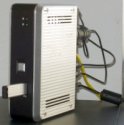 The Damn Small Linux (DSL) project has introduced a tiny PC based on a custom passively cooled nano-ITX board. The “Damn Small Machine” (DSM) is powered by an 800MHz Via Eden processor, and could well be the first complete, off-the-shelf nano-ITX based system.
The Damn Small Linux (DSL) project has introduced a tiny PC based on a custom passively cooled nano-ITX board. The “Damn Small Machine” (DSM) is powered by an 800MHz Via Eden processor, and could well be the first complete, off-the-shelf nano-ITX based system.
(Click for larger view of the smallish system)
Although, the DSM does not use a nano-ITX board from Via, the chip and board company that invented the standard, DSL's DSM page does not reveal its source for the hardware. However, a close look at the photos hints that ICOP may be the supplier.
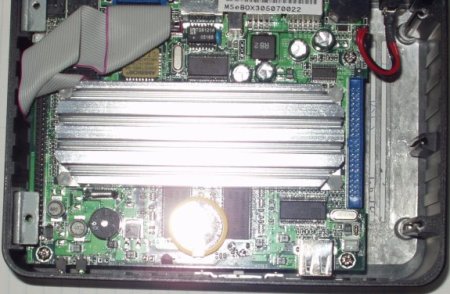
Hmm… Is that an ICOP eBox dev board built for Microsoft?
(Click to enlarge)
Mini-ITX.com, a UK-based mini-ITX specialist, earlier announced a cleverly named “Nanode” system to based on a Via nano-ITX board; however, the system reportedly was nixed due to contractual disputes.
Although introduced several years ago, nano-ITX never really caught fire the way mini-ITX did. Today, it remains a fairly low-volume, high-cost niche, with most nano-ITX boards aimed at industrial computing applications. And indeed, with soldered-on processor and DRAM, the DSM's board reflects the current rugged, industrial nature of nano-ITX.
Strangely, no actual dimensions for the DSM are listed. However, the system is obviously quite small — possibly about the same size as an Apple Mini, or just slightly larger.
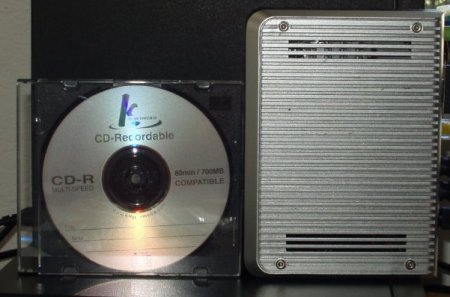
The DSM is darned small
(Click to enlarge)
Listed features include:
- Via Eden Nano 800Mhz (fanless)
- 256MB DDR266 (not upgradeable)
- 10/100Mbps LAN
- Audio I/O
- 1 x UltraDMA 44p (laptop flavor) IDE connector
- 2 x USB 2.0 ports (one at front)
The DSM ships with a 256MB USB pen drive with DSL pre-installed. The operating system can serve out-of-the-box as an SSH/FTP/HTTP server, and comes with several custom graphical admin tools said to be fast yet easy to use.
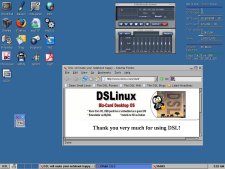
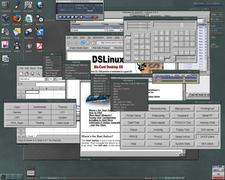
DSL versions 2.3 (left) and 3.1 (right)
(Click each image to enlarge)
Desktop DSL applications include xmms, ftp client, dillo, Netrik browser, Firefox, spreadsheet, sylpheed, spellcheck (US English), ted, beaver, vim, nano, xpaint, xzgv, xpdf, emelfm, naim, vncviewer, rdesktop, ssh/scp server/client, dhcp client, ppp, pppoe, web server, calculator, generic and ghostscript printer support, nfs, fluxbox, jwm, games, system monitoring apps, commandline tools, USB support, PCMCIA support, and even some wireless support.
Damn Small Linux (DSL) began as an experiment to cram as many desktop Linux applications as possible onto a 50MB live CD. Today, versions of DSL are available that boot from USB pen drives, IDE CompactFlash drives, and even traditional hard drives. The focus is still on minimalism, though, with hardware requirements listed as a 486DX with 16MB of RAM — or 128MB if you want to run it from a RAM disk, with all the instantaneous responsiveness that that will bring, even on ancient hardware. Additionally, one available version of DSL can run in a virtualized environment within Windows.
Availability
The DSL Project is offering the DSM direct in three configurations, priced as follows:
- With 1GB IDE flash drive — $475
- With 512MB IDE flash — $399
- No drive — $329
The Puppy Linux project, another minimalist desktop Linux distribution, also sells hardware.
This article was originally published on LinuxDevices.com and has been donated to the open source community by QuinStreet Inc. Please visit LinuxToday.com for up-to-date news and articles about Linux and open source.